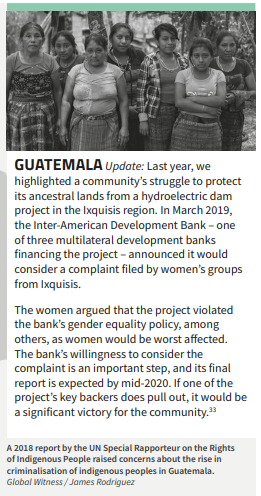Article by PBI-Canada

On August 1, the Peace Brigades International-Guatemala Project posted an article from Nomada, an independent platform for investigative journalism, titled: Guatemala: the sixth most dangerous country in the world to defend land and environment.
That article notes: “According to [the human rights organization] Udefegua [Unit for the Protection of Human Rights Defenders in Guatemala], in 2019 494 assaults were reported against human rights defenders, including 15 murders.”
It adds: “These figures include 157 attacks on people defending the territory and indigenous peoples, the environment and the right to land.”
The Global Witness Defending Tomorrow report documents that 12 land and environmental rights defenders were killed in Guatemala last year.
As noted in the Nomada headline, that’s the 6th highest number in the world but also the 4th highest per capita in the world.
PBI first operated a project in Guatemala from 1983-1999, which closed following the Peace Accords. Unfortunately, the human rights situation soon began again to deteriorate, and local organizations asked PBI to return.
The current project opened in 2003.
As noted in PBI’s 2019 Annual Review, “In Guatemala, 22 volunteers stood beside those defending their territories against the imposition of large-scale economic projects. They have witnessed the criminalization of these brave people and raised the issue with the Guatemalan government and diplomatic corps. Despite challenges, PBI continues to support movements of resistance against injustice.”
PBI-Guatemala accompanies 10 organizations, including the Cunén Communities’ Council, the ‘New Day’ Ch’orti’ Campesino Central Coordinator, the Peaceful Resistance Cahabón, and the Union of Campesino Organisations for the Verapaces.
Excerpt from Global Witness report:

